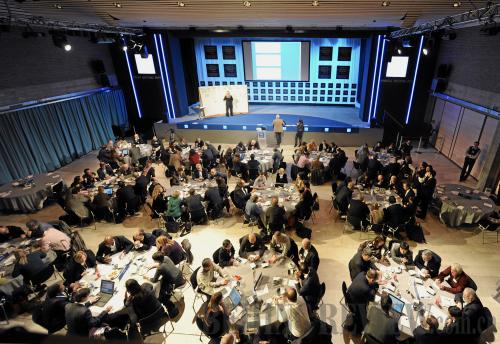|
 |
|
(COURTESY OF WANG RONG) |
The 40th World Economic Forum, held in Davos, Switzerland, on January 27-31, drew more than 2,500 political, economic and academic leaders from around the world, amid an international spotlight and high expectations.
It has more than lived up to the hype: Indeed, the annual event offered a powerful, signature depth of understanding and a call to arms addressing the well-known frailties of the world economy.
 |
|
SPIRITED DEBATES: Participants hold discussions at the annual meeting of the World Economic Forum in Davos on January 31 (XINHUA) |
With the theme of "improving the state of the world: re-thinking, re-establishing and reconstruction," this year's meeting was aimed at exploring the post-crisis global economy and, in particular, a "sustainable recovery roadmap."
New norms
The theme of the first symposium at this year's Davos forum addressed the question: What is the "new normal" in the world growth?
The "new normal," an idea conceived by Mohamed El-Erian, CEO of the global investment management company PIMCO, became a key term in the forum. The word "normal" alludes to the stability of the global economy prior to the financial crisis.
This "new normal" has proven controversial based on the questions it poses: What kind of lessons can we learn from the crisis? And how should the world develop new rules and mechanisms to ensure the continued development of the increasingly globalized economy?
Although a consensus was reached that the "new normal" will have to possess different meanings in different areas, post-crisis reform remains badly needed.
Regarding the post-crisis financial system, for example, the "new normal" would be a combination of lower financial leverage coupled with a more robust government intervention.
The world would embrace a different financial system, in which strict regulation would be the "new normal," said Michael Spence, a Nobel Prize laureate in economics. In this system, he added, capital requirements would be high, and the banking system would be more effective.
For the global macro-economy, the "new normal" will signify a higher degree of uncertainty.
Some participants argued, for instance, that after the crisis, the global economy will be hard pressed to revert to its previous rate of strong, steady growth. As the economic recovery will remain slow, moreover, the pain will continue.
But White House chief economic adviser Lawrence Summers did not ascribe to this pessimistic view. The U.S. economy, he said, will probably not fall prey to this "new normal," and that the likelihood of rapid growth still exists.
Regulation controversies
Whether and how to strengthen financial supervision was another focus at Davos. A week before the forum started, U.S. President Barack Obama's "financial reform plan" made the subject white hot. Political leaders with a mandate for popular reform suddenly found themselves at odds with major banking and financial institutions.
| 